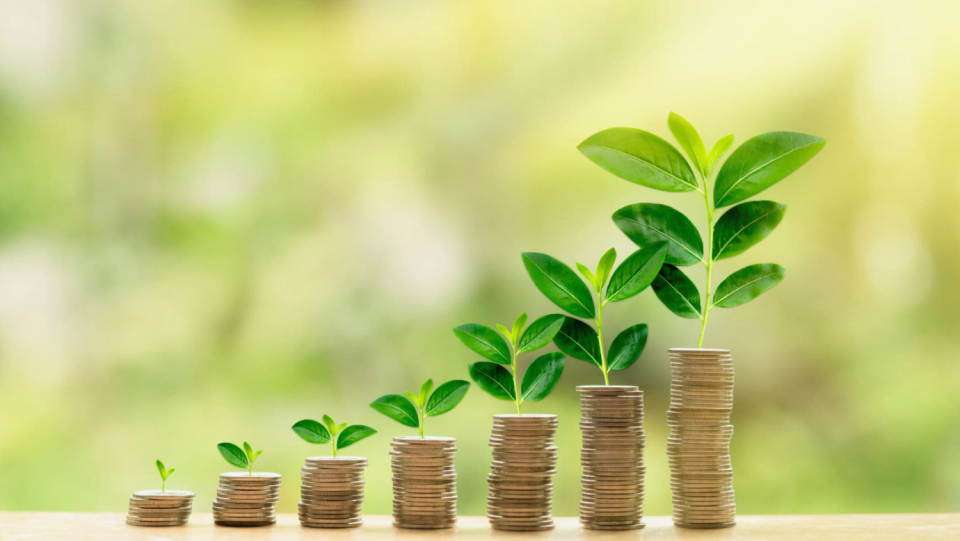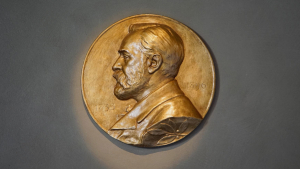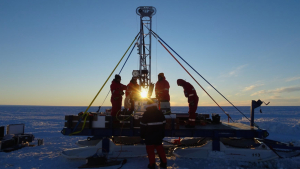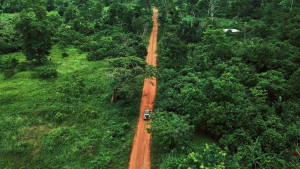In 2017, the world got to know a new word: flight shame. It is derived from the Swedish expression "Flygskam" and means that because of the environmental damage of air travel, one should rather do without them, and should even be ashamed of it. But the aviation industry is of enormous importance for the economy - aircraft not only transport people but also goods. In addition, it is a not too negligible technology driver. Aircraft manufacturers are therefore under pressure to become more efficient, to reinvent themselves, possibly even fly climate -neutral - and that while increasing their economic output. Green growth par excellence.
The idea of such sustainable or green economic growth is booming in view of the increasingly visible and noticeable consequences of global warming and the unchecked progression of species. The promise also sounds too tempting: to finally get a grip on the climate and natural crises and still not have to do without expanding value creation. Whether in the national plans to achieve climate neutrality or in the economic programs endowed with unprecedented sums of money after the corona pandemic – further, even increased growth with lower resource consumption and fewer emissions of climate-damaging carbon dioxide (CO2) plays a central role.
The German federal government of the SPD, Greens and FDP has included this leitmotif under the slogan "climate-neutral prosperity" in its coalition agreement. "We see the path to a CO2-neutral world as a great opportunity for Germany as an industrial location. New business models and technologies can create climate-neutral prosperity and good work ...", it says.
But can this project work? Is a really green, careful economic growth possible at all? People from science, politics and society have been arguing about this for a long time. Some see a fundamental mistake in theory. Because the prerequisite for growth that neither the climate crisis nor the exploitation of the remaining nature continues unchecked would be to dismantle the consumption of energy, raw materials or land space from the gross domestic product (GDP): to produce more goods and services without further environmental costs to drive up.
Environmental awareness as a driving force
Proponents of the theory combine above all the basic conviction that innovations and technological progress increase the efficiency of production steadily and thus enable green growth indefinitely. Innovation drivers are the needs of the market, which in turn reflect the respective social priorities. A belief of this economic school is: Every demand creates its supply. According to this logic, the request of a majority of the population of climate neutrality or effective protection of biological diversity could prove to be a driving force for the development of increasingly environmentally friendly products or production processes.
However, critics believe that at least an absolute and comprehensive decoupling - reducing environmental pollution and at the same time increasing economic output - has never worked.
Among the prominent skeptics of the theory is the Cologne biologist and economist Joachim Spangenberg. Together with five other researchers and one female researcher, he evaluated the scientific literature on the subject. In its report, titled "Decoupling debunked," the team concludes that there has never been an example, past or present, of separating economic growth from environmental pressures to an extent that is anywhere near sufficient to prevent ecological collapse. Growth is not possible without further resource consumption," says Spangenberg. It follows that green growth is an illusion."
In individual cases, it can be achieved with unique technical innovations, growth and at the same time reduce resource consumption, says the vice -chief of the ThinkTank "Sustainable Europe Research Institute Germany". "But if you want to grow all the time, you have to constantly improve to need less material." And innovations also reach limits. So it is possible to double or triple the current recycling rates through a mature circular economy, Spangenberg names an example. "However, we cannot hide them because the laws of thermodynamics cannot be canceled by the majority decision of the parliament," he criticizes the far -reaching political definition of the concept of green growth. In addition, a constant increase in efficiency must already be "priced in". "If we want to adhere to our climate budget, we have to triple the increase in efficiency anyway - economic growth then comes on top."
Just as there is no uniform definition of "green growth", the term decoupling is also used very differently. There are considerations that focus on the consumption of raw materials or energy, and those that include measurable environmental impacts. In most cases, greenhouse gas emissions are taken into account, as they can be measured relatively easily. Other concepts include factors such as air pollution, water quality or soil erosion. However, the assessment also increasingly refers to biodiversity as a whole, and measures such as the ecological footprint are being brought to the fore, which are intended to prevent a regional consideration of the growth costs only.
Does it always have to be about growth?
Numerous studies have examined how plausible it is to be able to continue to rely on unlimited growth, the consequences of which for the environment are cushioned by decoupling the required resources. In a recent evaluation of more than 800 individual studies on the relationship between economic growth, greenhouse gas emissions and the consumption of materials and energy alone, a team of authors led by Dominik Wiedenhofer from the Institute of Social Ecology at the University of Natural Resources and Life Sciences Vienna comes to a similar conclusion as Spangenberg and his colleagues. "However, as a rule, they either did not provide convincing evidence of absolute decoupling of the required magnitude, or remained inconclusive, " the multidisciplinary team of authors writes. The researchers criticize the fact that many studies do not question the primacy of growth. A "potentially fundamental incompatibility between economic growth and systemic social changes to cope with the climate crisis" is hardly considered. More comprehensive and long-term analyses are needed, including, for example, supply chains.
Other researchers explicitly draw an even more critical conclusion with a view to the Paris climate goals. "Empirical evidence does not support the theory of green growth," anthropologist Jason Hickel from the London School of Economics and the economist Giorgos Kallis from the Autonomous University of Barcelona in a much -respected study. Even if the decoupling is related solely to carbon emissions, it is highly unlikely that absolute decoupling will be reached at a pace that is fast enough to prevent global warming of more than 1.5 or 2 degrees, even at optimistic political conditions «. The conclusion of the researchers: "Green growth is a wrong way." The social decision -makers urgently need to look for alternative strategies.
Scientific debate with real consequences
This is where the researchers hit the political core of the debate. The question of whether decoupling and thus green growth are viable concepts or not is more than an academic dispute. Many politicians around the world rely on it to achieve their goals. This applies, for example, to the climate targets, but also to the new global framework for the protection and sustainable use of biological diversity, which is to be adopted in December 2022 at the World Conference on Nature in Montreal, Canada.
In the European Post-Corona rehabilitation plan, which is equipped with 750 billion euros, under the keyword "Next Generationeu" is used for growth with simultaneous climate protection. Together with the seven-year budget of the community, the fund, as a historically largest economic stimulus program with a volume of almost two trillion euros, is to create a "greener, more digital and more resistant EU", promises the Commission. A third of the funds are said to flow into the "Green Deal", which is to make economic growth green until the middle of the century.
Decoupling as the ideal road to the goal of making Europe the world's first climate-neutral continent by 2050. Opposition comes from an EU-owned organization, the European Environment Agency (EEA) based in Copenhagen. The specialist authority is to provide political decision-makers with scientific recommendations for action. Your word carries great weight in professional circles. In their study published at the beginning of December 2021, the EEA experts warn against an exclusive fixation on green growth as a way to more climate protection and sustainability. "However, given nature's finite capacity to provide resources and absorb pollution, there are doubts as to whether infinite economic growth is possible," they write. Because so much environmental damage has already been done worldwide, an "unprecedented decoupling of economic growth from environmental pressures would be necessary," they suggest.
Even if the EU experts, just like Spangenberg and others, have doubts about the feasibility of this decoupling, none of them advocates abandoning the idea altogether. "Striving for the widest possible decoupling can be a building block on the way to achieving, for example, the climate goals, but only a small one," says Spangenberg. "The crisis is so big, we need all the instruments. And the EU experts advise: "These uncertainties do not mean that Europe should abandon its concept of green growth." Rather, the focus of the efforts should be on making the transformation of the international community towards more sustainability, initiated by the EU Commission, a success. To this end, an attempt should be made to redesign the economy in such a way that it can ensure the well-being of society even with a shrinking GDP.
In a departure from always concentrating on growth, Economist Spangenberg also sees a solution. A different social awareness is also necessary here, the prosperity not only in consumption. Everyone can make a contribution to this, says the researcher. "It is also about realizing that our standard of living is expressed in what we use every day and not in what we buy every day," he says. That is why Spangenberg also thinks supposedly small initiatives are important, such as proceed against the fact that products break up immediately after the warranty period - the so -called planned obsolescence. Or to rethink the concept of fashion: Most cars and most of the furniture, for example, would be retired and replaced by new products with a lot of energy and environmental pollution because they got out of fashion; And not because they no longer worked or could not be repaired. "Why does our socially prestige depend that we have the latest at home and not that we use things as long as possible?" Asks Spangenberg. Then maybe the advertising industry would have a problem - the environment and people, on the other hand, would have a decisive less.



















